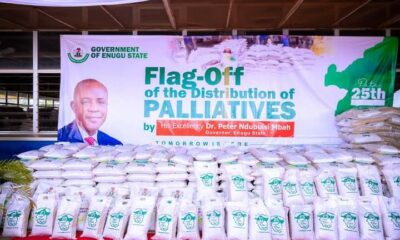Energy
Will Nigeria listen to IMF’s call to remove fuel subsidy?


BY: Lukman Otunuga, FXTM Research Analyst
The IMF has once again called on Nigeria to phase out government fuel subsidies, citing better use of the funds on social safety nets like healthcare, education and freeing up fiscal resources for infrastructural projects.
Historically, fuel subsidies are an extremely sensitive issue which can have various impacts on economic growth and investor confidence.
Following the IMF’s recent report, the finance ministry was quick to reject the idea of completely dropping the popular fuel rebate on the basis that the state imports all fuel and includes the subsidy as a cost of doing business.
The money factored into energy imports as a fuel subsidy for 2018 was at an eye-watering level of N713 billion, far higher than the budgets for education or healthcare, according to reports.
The cost of the fuel subsidy fluctuates according to global Oil prices, meaning that inflation in the international Oil markets can spike the subsidies overnight, risking unexpected drains on public coffers.
At the time of writing, Nigeria’s economy is improving and the IMF projects full-year GDP growth results of 2.1 percent in 2019 and 2.5 percent in 2020. When balanced out against the prospect of negatively impacting growth, one can understand the caution over abandoning fuel subsidies.
Let’s take a look at both sides of the coin. What if the finance ministry decides to listen to the IMF? In this scenario, it could reinvest the fuel subsidy into social support infrastructure and fiscal savings.
These savings could be used to improve Oil refining resources and lessen Nigeria’s reliance on imported processed fuel, thereby boosting the local Oil industry’s domestic market instead of selling foreign fuel.
This process would take a long time and risk the likelihood of instability if there is a backlash but in the long term it would increase Nigeria’s fuel independence.
Having said that, inflation could rise along with fuel prices, negatively impacting economic growth and consumer spending on fuel. So, if subsidies were to be removed, it’s likely the policy change would be in phases to avoid unexpected economic shocks.
And what if the government decides against the IMF’s advice? The risk of outright instability could be lowered and the economy can stay on track to grow as expected, but the vulnerability of Oil price spikes remains a constant short-term threat amid a steadily climbing national debt. Nigeria’s gross national debt is seen rising to 31.4 percent in 2020, according to the IMF.
That’s compared to 28.4 percent in 2018 and 30.1 percent in 2019. When total external debt is factored in, Nigeria faces a cash-flow dilemma that’s not easily solved.
External debt, including private and public sector debt, is seen rising to $69.8 billion for the full-year 2019, from $63.4 billion in 2018, while foreign reserves stand at an estimated $38.5 billion.
Increased risks to the financial and banking sectors can’t be ruled out if the state doesn’t improve its fiscal strength and readiness to rescue any systemic entities.
The good news is that the economy is back on track towards sustainable growth. If a policy solution to the fuel-subsidy predicament is found which increases fiscal strength while avoiding inflationary pressures, there could be long-term benefits to Nigeria’s economy.
Energy
AVEVA Appoints Joanna Mainguy as New Sustainability Accelerator Director


- Joanna Mainguy will steer strategies for sustainability innovation across AVEVA’s portfolio and partner ecosystem, furthering ESG targets for 2025 and beyond
AVEVA, a global leader in industrial software, driving digital transformation and sustainability, today announced the appointment of Joanna Mainguy as Sustainability Accelerator Director.
Joanna’s appointment testifies to AVEVA’s dedication to strengthening the company’s sustainability impact in line with advancing global climate commitments.
As Sustainability Accelerator Director, Joanna Mainguy will focus exclusively on sustainability solutions and strategies to accelerate innovation that will help AVEVA’s customers to achieve their net-zero targets.
She will look at how AVEVA leverages current market and customer analysis to inform its in-house development team, advise on new customer collaborations and on how AVEVA should grow its partnership network and M&A pipeline to reflect its sustainability priorities.
Joanna will lead the implementation of a sustainability solutions plan tailored to meet the most pressing needs of AVEVA’s industrial customers on low-carbon transition, circularity and resilience, via an integrated product, marketing and sales approach. She will work closely with AVEVA’s portfolio, business area and R&D leads to continue to develop new sustainability capabilities and drive collaboration on go-to-market initiatives that support industry with contributing to an accelerated energy transition and shift to a circular economy.
Joanna was formerly Industry Director, EMEA, for Energy & Sustainability at Microsoft, where she led strategic engagements with major energy providers and supported the energy transition with digital solutions. She has worked across the entire energy value chain and has more than 15 years of experience in process industries and the energy sector, including work for major system integrators, software and energy companies.
Lisa Wee, Global Head of Sustainability, AVEVA, said: “We are excited to welcome Joanna to AVEVA. She will bolster our mission to enable faster uptake of existing sustainability solutions across the industrial landscape, while in parallel we continue to invest in product capabilities and partnerships that will push out the frontiers of sustainability innovation for industry. At AVEVA we look to lead by example on sustainability and we achieved a 93% reduction in Scope 1 and 2 emissions last year. We aspire to help our customers better leverage digital solutions to realize their own ambitious sustainability targets early, and Joanna brings a wealth of experience to help support this.”
Commenting on her appointment, Joanna Mainguy, Sustainability Accelerator Director, AVEVA, said: “I am delighted to join AVEVA at such a pivotal time in its sustainability innovation and growth trajectory. I look forward to working with AVEVA teams and customers to continue to grow the sustainability benefits that can be achieved with AVEVA software. I am also keen to work closely with our partners to drive further positive change at scale, since we know addressing the climate crisis will continue to require expanded collaboration”.
AVEVA actively embeds sustainability into its core product strategy with specific capabilities in its software portfolio.
AVEVA’s software enables organizations to connect and contextualize key sustainability data with artificial intelligence and human insight, enhancing their agility, resilience and sustainability in order to help drive responsible use of the world’s resources.
AVEVA’s 2023 Sustainability Progress Report reveals significant progress across all three pillars of the company’s sustainability framework, encompassing product strategy, operations and culture.
Energy
Climate Change: NNPC Ltd/Total Energies JV Achieves Zero Gas Flare



In pursuit of meeting the targets of 20% (unconditional) and 47% (conditional) greenhouse gas emission reduction as contained in the Nationally Determined Contribution under the Paris Accord signed by the President Bola Ahmed Tinubu administration, the NNPC Ltd/TotalEnergies Joint Venture has achieved zero routine gas flare in all its assets.
According to a statement signed by Olufemi Soneye, Chief Corporate Communications Officer, NNPC Ltd., this feat was announced on Thursday during an inspection tour of OML 100 in South-eastern Niger Delta, off Port Harcourt, by a joint NNPC Ltd and TotalEnergies Team to ascertain the success of the OML Flare Reduction Project launched in December 2023.
The NNPC Ltd/TotalEnergies Joint Venture, which is the concession holder of four leases, had hitherto achieved zero routine flaring across OML 99 (2006), OML 102 (2014), and OML 58 (2016), leaving OML 100 as the only lease with routine flaring going on.
The significance of this achievement is that the last routine flare volume of about 12MMscf/d (twelve million standard cubic feet per day) of gas has now been eliminated giving rise to a greenhouse gas emissions reduction of about 341KtCO₂e/yr.
The achievement is an outcome of a programme introduced by the NNPC Ltd to galvanize action towards achieving the zero routine flare by 2030 across its portfolio of assets.
It is also a testament to NNPC Ltd’s prioritization of sustainability anchored on the ‘first R’ of its 5R Strategy (Reduce, Replace, Renew, Re-plant, Repurpose), as it strives to reduce its carbon footprint.
Work is ongoing across all other assets within NNPC Ltd’s Upstream Directorate to ensure that all assets achieve zero routine flaring by 2030 or earlier.



In line with President Bola Ahmed Tinubu’s directive to the Nigerian National Petroleum Company Limited (NNPC Ltd) to optimise production from the nation’s oil and gas assets, the Company has announced the successful commencement of oil production from the Akpo West Field.
The milestone, which is the result of meticulous planning, strategic collaboration, and unwavering dedication from all stakeholders involved in the project, will add 14,000 barrels per day condensate to the nation’s production. This will be followed up by the production of about 4million cubic meters of gas per day by 2028.
The development of Akpo West which is on Petroleum Mining Lease (PML) 2 (formerly OML 130) leverages the existing Akpo Floating Production Storage and Offloading (FPSO) facility via a subsea tie-back to keep costs low and minimize greenhouse gas emissions.
The milestone was enabled by the strategic leadership of the Group Chief Executive Officer (GCEO), Mr. Mele Kyari, and the Upstream Directorate of the NNPC Ltd whose support played no small role in propelling the operators to actualise the short- and mid-term hydrocarbon production goal of the President Tinubu administration.
Located 135 kilometres offshore, Akpo West is one of the discoveries on PML 2 with proximity to the Akpo main which started up in 2009 and produced 124,000 barrels of oil equivalent per day in 2023.
PML 2 is operated by TotalEnergies with a 24% interest, in partnership with CNOOC (45%), Sapetro (15%), Prime 130 (16%), and the Nigerian National Petroleum Company Ltd as the concessionaire of the Production Sharing Contract (PSC).
-



 Politics4 days ago
Politics4 days agoEnugu State Government Flag Off Palliative Distribution In The State
-



 Tech5 days ago
Tech5 days agoAnambra School Emerges Winner In National Girls In ICT Competition With Groundbreaking VR Technology
-



 Spotlight5 days ago
Spotlight5 days agoNigerian Woman Breaks Guinness World Record With 55-Hour Interview Marathon
-



 News5 days ago
News5 days agoNiger State Prisoners Run From Facility After Rainstorm Brings Down Part Of Fencing
-





 News4 days ago
News4 days agoEFCC: New Documents Extracted Shows Yahaya Bello Allegedly Paid School Fees To The Tune Of $845,852,84 For His Family Members
-



 News3 days ago
News3 days agoKing Charles Reportedly “Really Unwell” And Funeral Plans Are Currently Being Reviewed
-



 Entertainment3 days ago
Entertainment3 days agoBig Congratulations To BBNaija Star, Miracle Igbokwe Who Graduated With Distinction From Embry-Riddle Aeronautical University In Florida USA
-





 Finance3 days ago
Finance3 days agoAISA Has Refunded The Fees Paid By Yahaya Bello To EFCC








